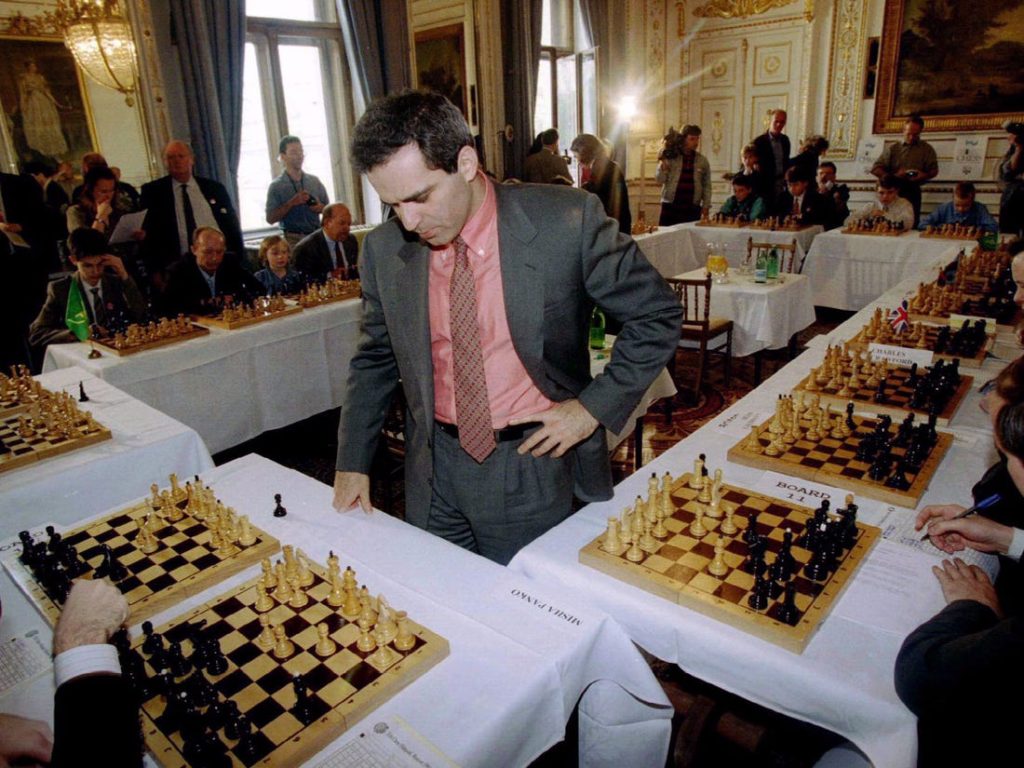My buddy Michael can beat you at chess. You know the hyperbolic expression, “he’s so good he can beat you blindfolded“? In Michael’s case, the playground taut is totally true. He doesn’t even need to look at the chess board to stomp you. Blindfolded chess is a thing. And Michael is proficient. After the game, he can show you all 20 moves, or 50 moves. He remembers them all. He can explain—gently and without condescension—where you made your mistake. He can point out, “on your 11th move you played Bd5. Better would have been Nd3.” If you’re interested, he can go on: “Karpov played Nd3 against Kasparov in 1985.“ His knowledge of previous world championship games is prodigious.

But, wait. There’s more: Take off the blindfold and Michael can beat you and 20 of your friends. It’s called a “simultaneous.” Michael walks from one board to the next, making an almost instantaneous move in each game. He analyzes each game and moves a piece instantly. You and your friends take all the time you need. It doesn’t matter. Michael will win every game, all 21 of them.

In almost every city in the United States, Michael is the best player of the hundreds of thousands of people living there. There aren’t ten thousand people out of seven billion on the planet who can best him in a game of chess.
But at the Manhattan Chess Club, he can’t beat anyone. Not one person there. Not one game. Because the MCC is peopled only by the best chess players on the planet. Even Michael gets trounced there by winners of international tournaments. Michael’s knowledge and ability–prodigious though they are–are a drop in the ocean. At the MCC, Michael could be one of the 20 players in the simultaneous exhibition being slaughtered by the guy moving quickly from board to board. It’s a steep pyramid.

My daughter’s cross country coach has a phrase to sum up this phenomenon. She calls it “strength of schedule.” There’s always somebody faster. Invariably there’s also somebody you can beat. Given the inexorable reality that “you can’t win ‘em all” is a fact, why are we brutalizing our beloved children, nudging them to internalize a sense of self contingent on whether or not somebody else’s daughter traversed 5K several seconds faster?

If winning doesn’t matter, why do they keep score? asked a coach before his players returned to focusing on whether or not they would have lifelong cognitive impairments resulting from traumatic brain injuries sustained from following his exhortations to “play through the pain!“ and “hit hard!” To which I would also inquire, if your child is not going to win an Olympic gold—this just in: she’s not—why focus on anything other than her sense of who she is independent of scoreboard or stopwatch?
As always, your relationship with your child takes precedence. If your daughter feels secure, attached and connected, she is less likely to obsess over a loss. She is also less likely to seek solace in the company of adolescents who will encourage her to make horrific choices. You want your child to say, “no thank you. I’d rather be home.” Second best is “I have to be home.” But either way, she has to feel comfortable extricating herself from bad situations that are ubiquitous and inevitable. The child who feels pressured and judged is less likely to tell her unbearable friends that she’s going home. On the other hand, the child who feels enveloped by unconditional positive parental regard may well decide not to get in Perri’s car after Perri has consumed enough alcohol to drown a small moose. She won’t care about the pressure to have another glass of punch. She won’t succumb to doing that which makes her uncomfortable.

She’ll be happy to be home where no one particularly cares how fast she runs, how many goals she scores, how many people she can beat at chess.
Remember who won the gold medal in the 400-meter swim in the most recent Olympics? Neither does anyone else. Remember the girl who came to harm because she didn’t feel comfortable in her own home, the one who got in that car against her better judgment? Her parents will live with that loss forever. No one, not even Michael, can help you understand the wrong moves that led to that unbearable outcome.


